Poodle Barking Guide: Do Poodles Bark a Lot?
Poodles are adorable, fluffy, stylish dogs. Is this what comes to mind when you hear the word “Poodle”? Probably, but Poodles are real, living, breathing animals even though they look like cute toys. So, the answer is yes – Poodles, indeed, bark.
As a Poodle expert I get asked all the time why Poodles bark, and how to train Poodle to bark less. You are not alone in wondering!
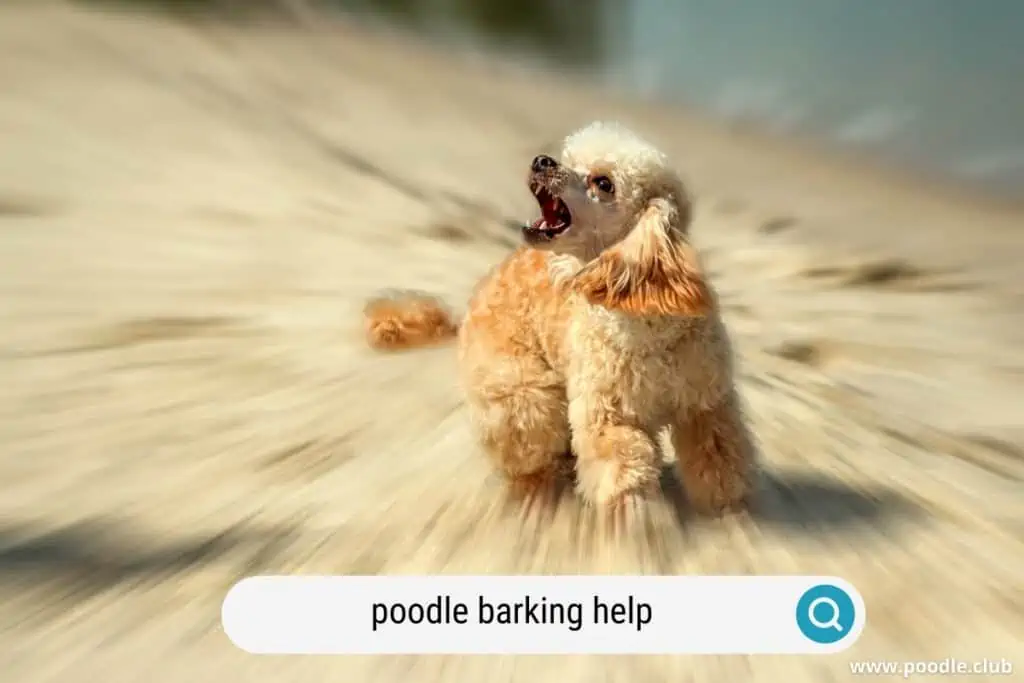
You might benefit from learning the expected behaviors of the dog breed you own or are considering as a family addition. Whether you are already a Poodle parent or considering becoming a Poodle parent, you’ve come to the right place to learn about the Poodle’s typical barking behavior. You can continue reading our Poodle barking guide to find out what to expect and how to stop excess barking.
Poodle Bark-O-Meter
Poodles can be considered moderate barkers on a barking-by-breed scale. In other words, Poodles are not on the quiet side nor the excessive barking side, but they are right in the middle.
Standard Poodle VS Mini Poodle
Standard Poodles are generally calmer and more laid back than Miniature Poodles. You can expect less barking from a Standard Poodle than from a Mini Poodle. Mini Poodles can still make great pets, but they may require a bit more training.

What Does This Mean for Poodle Owners?
Poodles’ expected moderate barking means owners should learn how to train their Poodles to “speak” and “quiet.” It may be necessary for those who live in populated neighborhoods to learn how to control their dog’s noise level. Gaining control over your dog’s noise level is beneficial also for those who do not live in populated neighborhoods.

It is nice to have a proverbial mute button for your dogs in case you need some peace and quiet.
PuppySpot is a reputable dog marketplace where you can browse and find compatible puppies right from the comfort of your home. They have placed over 200,000 puppies into homes in the US!
You do not need to worry. Training your Poodle to be quiet on command should not be complicated. We have compiled some training tips for you below to help you get started.
First, let’s talk about the reasons behind your Poodle’s barking and their different types of barks.
Why Do Poodles Bark?
Poodles bark, of course, because they are dogs. Dogs bark for many different reasons. So, what makes a Poodle bark?
- Poodles bark to exert leadership.
- This breed experiences bark-inducing anxiety (this is likely why they put so much barking effort into establishing leadership).
- Poodles are playful and excitable. They will bark if they become excited.
- Poodles will bark if they want attention.
- This type of dog will bark to protect its home and its pack (people and pet siblings).
One of the above emotional or instinctual reasons is likely behind your Poodle’s barking.
Barking Triggers
Now that we’ve discussed why your Poodle will bark, let’s talk about what might trigger your dog’s barking.
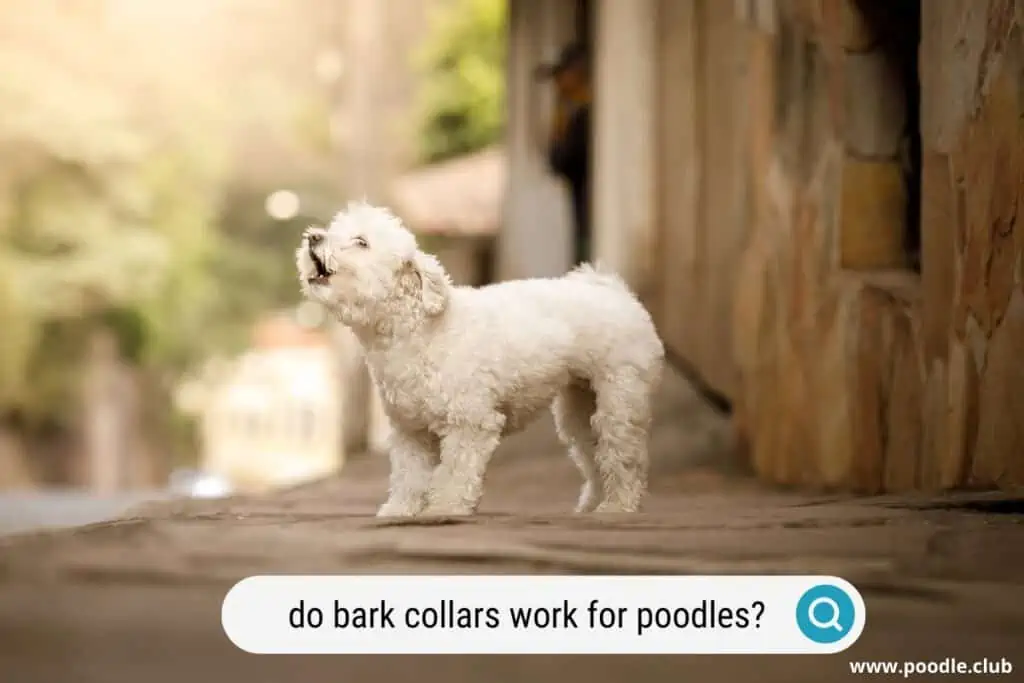
Here is a list of common triggers:
- Pack dominance rivalry
- Lack of attention
- Being left alone
- Loud noises such as thunderstorms, arguments, and fireworks
- Strangers approaching them or their pack mates (again, people and pet siblings)
- People, animals, or vehicles passing the house
- Picking up the scent of another animal in the vicinity
- Sensing danger to their home
- Feeling excited over the arrival of a family member
- Playing with a furry friend
Different Types of Barking
Each dog has a unique personality and voice, but, in general, dogs have varying types of barks that coincide with why they are barking.
Alert Bark
Your dog will begin alert barking if they feel they, their family, or their home is in danger. This type of barking will be loud, relentless, and may include growling. They will stop when they believe the situation is under control and they feel all is safe in their world.

Separation Anxiety Bark
Poodles love to be near their family. They will make a lot of noise if they are left alone for too long. This type of barking will sound sad and may be combined with a series of repetitive howling.
A separation anxiety bark may also sound anxious and urgent.
General Anxiety Bark
Your Poodle may experience anxiety in overwhelming situations. Some example situations include being present during loud play or arguments, hearing thunderstorms and fireworks, having a large crowd of company, and being in public crowds. This bark will sound fearful and urgent.

Your dog may also growl and sound aggressive when experiencing anxiety.
Playful Bark
Playful barking occurs during play. Your dog may make short, snippy barking sounds when playing. Poodles can also make a squeaky whining noise. You are likely to hear this during moments of intense, adorable playtime.
Talking Bark
Your Poodle will probably use their voice to communicate with you. This is my personal favorite type of barking. This barking will be quieter and much cuter than the other types of barking.

Your Poodle can use a combination of sounds, grunts, whinnies, snippy barks, and howls to get their message across. You will come to learn what your Poodle is trying to tell you with time.
You will begin to decipher your Poodle’s different types of barking as your relationship strengthens. Learning the ins and outs of your furry friend’s personality can be exciting.
How to Put a Stop to Excessive Barking?
Excessive barking can become an issue for Poodle owners who are not prepared to spend time training their dogs.
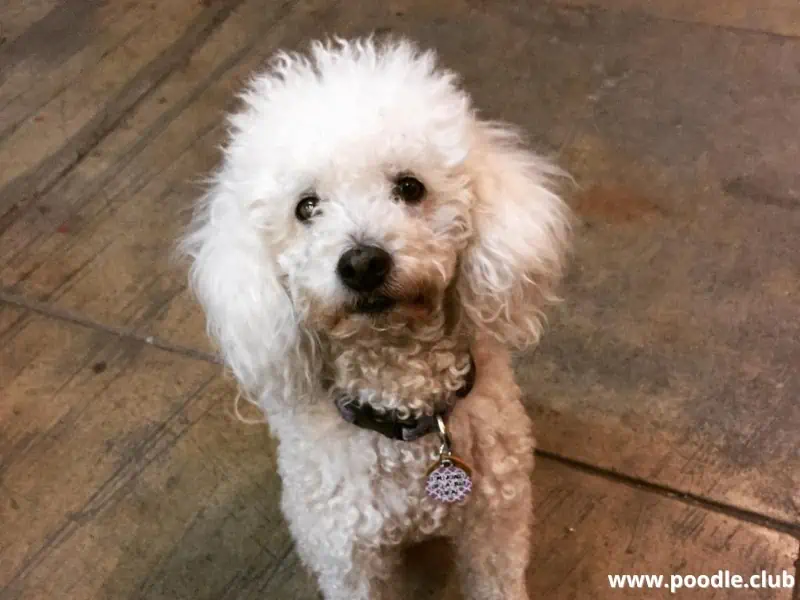
Training a Poodle is necessary, but it is not necessarily hard. Here are some training tips to help you prevent or stop excessive barking:
| Cause | Solution |
| Boredom | Provide toys and puzzles for mental and physical stimulation |
| Lack of exercise | Increase the amount and intensity of daily exercise |
| Separation anxiety | Gradually acclimatize the dog to being alone, using positive reinforcement and separation anxiety medication as needed |
| Fear or anxiety | Gradually expose the dog to the trigger in a controlled, positive manner, using positive reinforcement and possibly anti-anxiety medication as needed |
| Territorial barking | Train the dog to be calm and not bark when visitors come over, using positive reinforcement and possibly a bark collar |
| Attention-seeking behavior | Ignore the barking and reward quiet behavior, and avoid reinforcing the barking with attention or rewards |
| Medical issues | Consult with a veterinarian to rule out any medical causes and receive appropriate treatment |
It’s important to note that each dog is unique and may require a customized approach to addressing their barking behavior. It may be helpful to consult with a veterinarian or a professional dog trainer to determine the specific cause and appropriate solution for a particular dog’s barking.
Socialize Your Poodle
Poodles are known to be naturally standoffish around strangers. Socializing your Poodle beginning as early in their life as possible is the best way to prevent nervous barking in crowds. This is a simple training task to complete.
You simply need to bring your Poodle to different public places and have guests at your house as often as possible. The more social experiences your dog has with people and other animals, the more confident they will become – this means less excessive nervous barking!
“Quiet” Training
Come up with a command such as “quiet” or “shh!” to use as a cue when you want your Poodle to stop making noise. The best way to do this is by rewarding your dog’s success.
- You should have treats handy while you wait for your Poodle to begin barking.
- Say the command to be quiet when your dog begins barking.
- You can gently touch their snout to get them to stop for a moment if they do not seem to catch on.
- Give them a treat the instant they stop making noise. Do this even if a touch or distraction was why they stopped.
- Repeat.
- Be patient. Poodles are smart. Yours will catch on sooner rather than later.
It is important to avoid negative punishment as often as possible. Your Poodle is not likely to be incredibly stubborn and they will want to please you. Be gentle to avoid injuring their self-confidence.
Poodles who are self-confident are less likely to become problematic excessive barkers.
Avoid Triggers
You will want to avoid too many anxiety triggers until your Poodle has gained sufficient self-confidence. You should socialize them as often as possible, but use care and move at a comfortable pace for you and your pooch.
Desensitize Using Repetition
There was once a Mini Poodle named Max who lived on a quiet street in the suburbs. Every day, without fail, the mailman would come by to deliver the mail, and every day, Max would go absolutely bonkers.
He would bark and bark and bark, leaping up against the window to get a better look at the poor mailman as he walked by. Threatening and alarming despite the small dog’s size!
The local mailman, of twenty plus years (who was a kind and patient man), tried everything he could think of to get Max to stop barking. He tried talking to him in a soothing voice, and offering him treats. But no matter what he did, Max just wouldn’t stop barking.
One day, Max’s owners (and Poodle Club readers) decided they had had enough. They called a professional dog trainer to see if she could help them fix the problem. The trainer came over and spent some time observing Max and talking to his owners about his behavior.
After a few minutes, the trainer had an idea. She went outside and came back with a bag full of packages. She then proceeded to knock on the door and deliver the packages to Max’s owners as if she were the mailman.
At first, Max the Mini Poodle was super skeptical. He sniffed around the packages and gave the trainer a quizzical look. But as she continued to deliver more and more packages, Max started to get the idea.
He realized that the mailman wasn’t such a bad guy after all, and he slowly stopped barking every time he came by.
From that week on, Max was a changed pup. He still got excited when the mailman came by, but he no longer barked like crazy. His owners were thrilled, and the mailman was relieved.
And Max? Well, he was less stressed and was able to concentrate on the things a Poodle should – like naps and treats.
Conclusion
Poodles are moderate barkers. Poodle owners who have the ability and willingness to put in a bit of time and effort into training should not face problematic excessive barking. Poodles can make incredible, loyal, intelligent, adorable pets!



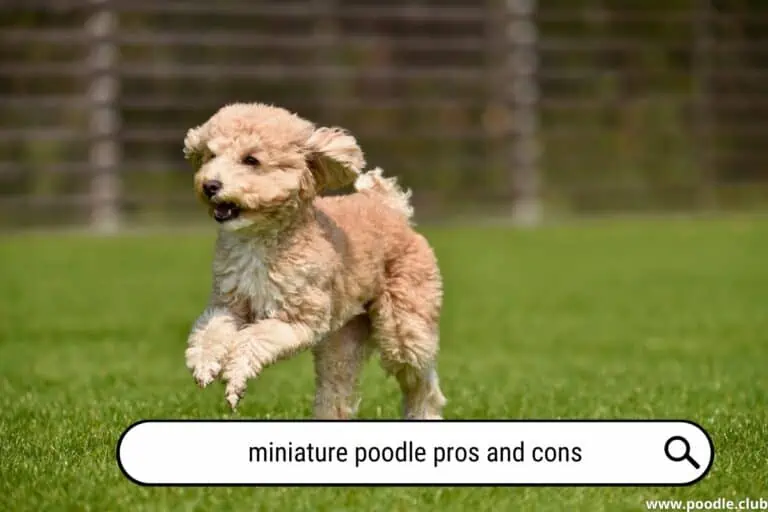
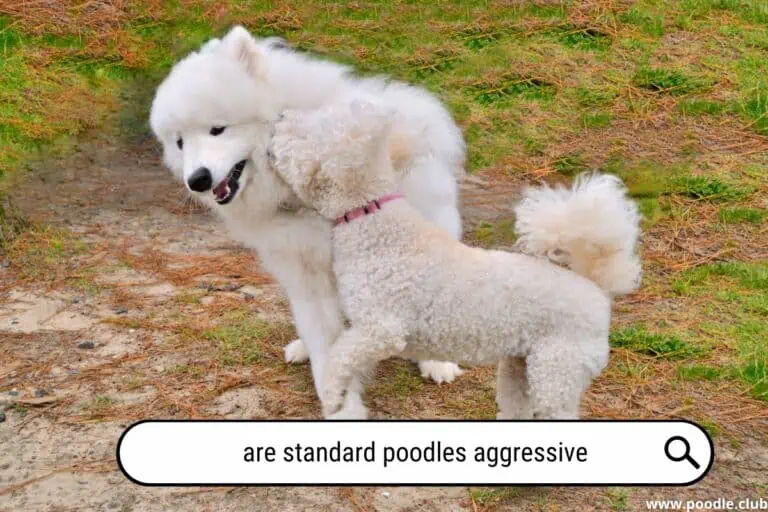

![How To Stop A Dog From Howling [Guide]](https://poodle.club/wp-content/uploads/2023/08/how-to-stop-dogs-from-howling-768x512.webp)
